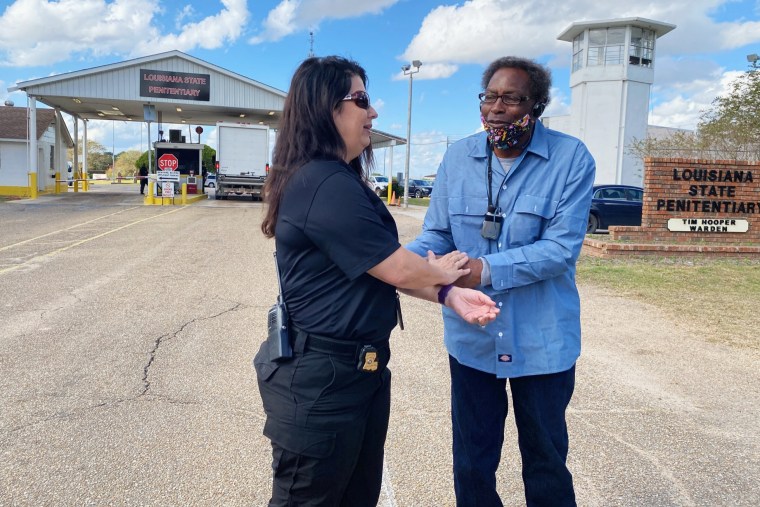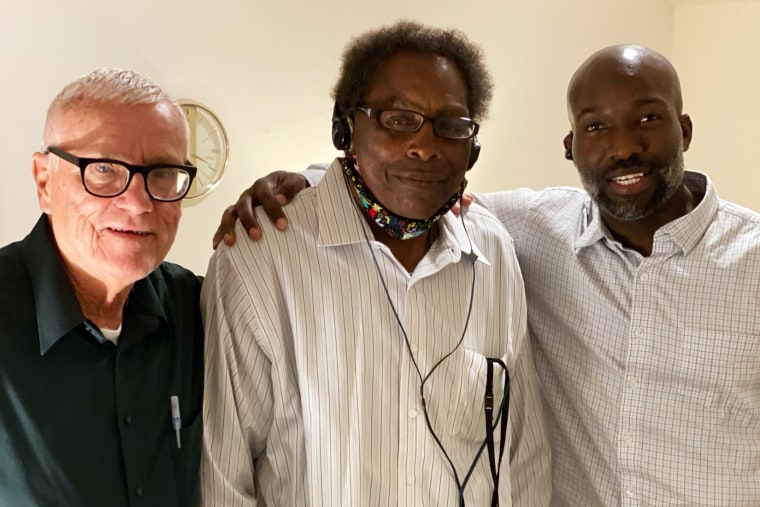A Louisiana man whose Supreme Court case allowed hundreds of juveniles sentenced to life without parole to be freed was released Wednesday after having served nearly 58 years in prison.
The man, Henry Montgomery, 75, was convicted of murdering East Baton Rouge Sheriff’s Deputy Charles Hurt in 1963, when he was 17 years old, and was sentenced to life in prison without parole.
Montgomery was skipping school when Hurt, in plainclothes, approached him. Montgomery has said that as a Black teenager living in the segregated South, he was startled and shot the deputy. He was originally sentenced to death but was later re-sentenced to life in prison without parole.
A three-member Louisiana parole board voted unanimously Wednesday in favor of parole. Montgomery has served most of his adult life behind bars at the Louisiana State Penitentiary, also known as Angola.
Upon his release Wednesday, Montgomery sounded upbeat.
"It’s wonderful. Everything has changed. It’s a whole new game," he said.

Montgomery, who has said he takes responsibility for the crime, expressed remorse for what he did.
"I’m really sorry that I, that this happened," Montgomery said at the hearing. "I am going to have to live with this all my life, the rest of my life."
The Associated Press reported that board member Tony Marabella said during the vote: "He’s been in prison for 57 years. He has an excellent ... disciplinary record. He is a low risk by our assessment. He’s got good comments from the warden. He has a very good prison record."
Marabella voted to approve Montgomery’s release with certain conditions, including a curfew and that he have no contact with the victim’s family.
The parole board had denied Montgomery’s application twice before, most recently in 2019.
Greeting Montgomery upon his release was Andrew Hundley, the first former juvenile lifer in Louisiana to have been released because of Montgomery’s Supreme Court case. After his release following nearly 20 years in prison, Hundley co-founded the Louisiana Parole Project, a nonprofit group that helps former inmates re-enter life outside prison. Montgomery will now be part of the program.

"Today, Henry being home is a symbol of hope," Hundley said. "For individuals who go to prison when they are young people, Henry coming home is a message to them that their lives matter and that they can redeem themselves and that they are better than the worst mistake that they ever made."
Hundley said it says a lot about Montgomery’s character "that he was happy and full of grace in knowing that people were able to come home after the U.S. Supreme Court decision that holds his name."
Hurt's family has continued to oppose Montgomery’s release. One of his daughters, Linda Hurt Woods, spoke Wednesday against granting parole.
"I don’t believe he’s sorry. He made a decision at 17 years old," she said. "You know right from wrong at 17 years old. I did. I was raised if I made a mistake, I suffered the consequences."
The Supreme Court ruled in 2012 that mandatory sentences of life without parole for juveniles were unconstitutional. The decision said in part that science showed that "it is increasingly clear that adolescent brains are not yet fully mature in regions and systems related to higher-order executive functions such as impulse control, planning ahead, and risk avoidance."
The Supreme Court then took up Montgomery’s case and ruled in 2016 that its previous decision could be applied retroactively to those who were already serving sentences of life without parole for crimes committed as juveniles. The ruling has led to the releases of hundreds of juvenile lifers, according to the Campaign for the Fair Sentencing of Youth.
In 2019, Montgomery told NBC News’ Lester Holt that he was satisfied that others had reaped the benefit of his Supreme Court decision and that he hoped more would continue to be released.
After his parole was denied in 2019, Montgomery said that as long as he was alive, “I’m going to keep my mind on trying to get out.”
“You got to keep your hope alive,” he said at the time.
Montgomery said after his release Wednesday that he couldn’t sleep the night before his hearing and that he wasn't sure he would get any sleep on his first night of freedom in decades. His first meal in the afternoon was a cheeseburger and fries.

